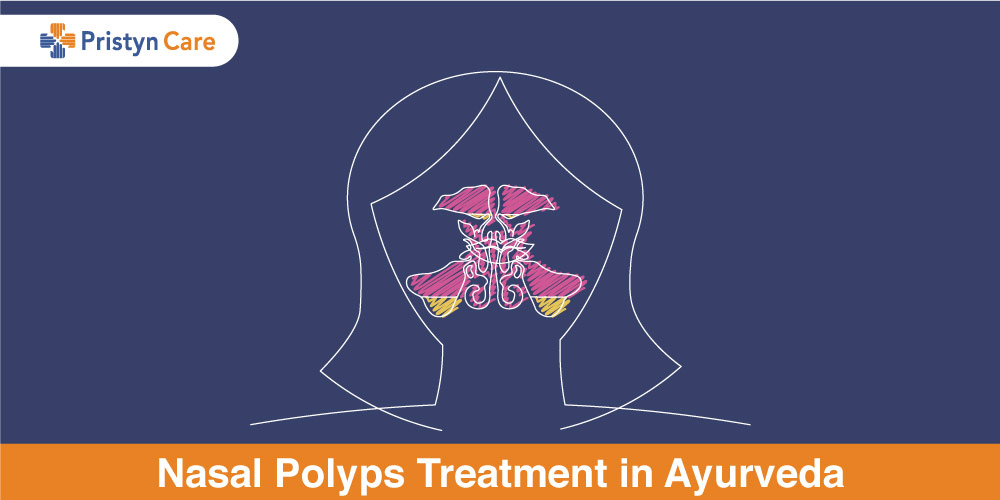
Have you been striving with the stubborn symptoms of nasal polyps? Have you tried taking all the remedies and still can’t find relief from these cold-like symptoms? If so, then you may be suffering from a condition called nasal polyps and not just a mere cold.
Table of Contents
What Are Nasal Polyps?
Nasal polyps are considered to be one of the most common ENT conditions, and many of the patients suffer from it without knowing what it is.
Nasal polyps are a collection of small non-cancerous tissue that grows inside the mucosal layer of the inner nose. Moreover, the nasal mucosa is a wet layer that not only protects the nose and sinuses from various pathogens entering into it. But also, humidifies the inner nasal canal and sinuses. There are two different types of nasal polyps: ethmoidal polyps and antrochoanal polyps.
Symptoms of Nasarsha or Nasal polyps
- Difficulty in breathing
- Rhinitis
- A stuffy nose that remains persistent
- Reduced sensation of smell
- Snoring
- Itchy sensation around eyes and a feeling of foreign body sensation
Ayurveda suggests immediate treatment if a person experiences recurrent, chronic rhinitis and pain while breathing via the nose.
Ayurvedic View of Nasal Polyps
Ayurveda defines nasal polyps to be closely related to Nasa arsha. It adds, it is a condition that arises due to increased Kapha Dosha. Vitiated Kapha Dosha promotes the growth of polyps in the wall of blood vessels as well as in the surrounding muscular tissues to give rise to swelling.
Furthermore, this inflammation in the blood vessels is known as Kapha-Rakta granthi.
In this condition, the patient may feel a blockage in the nasal canal that reduces the perception of a smell. In ayurvedic literature, Sushruta had explained about 4 types of Nasarsha: Vataja, Pittaja, Kaphaja and Sannipataja and also mentioned the 4 types of treatments for nasarsha which were Aushadhi, Ksharkarma, Agnikarma, and Shastra Karma.
Causes of Nasal Polyps
Ayurveda does not describe the exact etiology behind the cause of nasaarsha. But considers various factors to be associated behind it which include the
- A chronic manifestation of Rhinosinusitis,
- Nasal mastocytosis Cystic fibrosis,
- Sinusitis caused due to fungal allergy,
- syndromes like Young’s, and Churg-Strauss syndrome.
Ayurvedic Treatment of Nasal polyps
Turmeric milk
Turmeric powder contains curcumin that is known to exert potent anti-inflammatory properties. To use turmeric, try mixing a spoonful of turmeric powder in half a cup of lukewarm milk. Apply this mixture twice daily and see the size of nasal polyps reduce in size. (Also read: Benefits of Turmeric Water)
Ayurvedic Shadbindu oil
It is a herbal and ayurvedic medicated oil with anti-inflammatory and antimicrobial properties. It is a type of Nasya oil that is used to treat sinusitis and nasal polyps.
Steam Inhalation

Steam inhalation and the use of a regular humidifier can help control the symptoms of Nasal Polyps.
Regular Hygiene
Ayurveda also suggests maintaining regular hygiene which can help reduce the risk of having a bacterial or viral infection.
(Also Read: Difference between Viral and Bacterial Tonsillitis)
Hot spices
Spices like hot pepper and spice, which contains capsaicin can help clear sinuses by relieving inflammation. It also enhances immunity, promotes opening up of the nasal passages controlling the nasal polyp symptoms and its causes.
Nasal irrigation

Using a neti pot, also called nasal irrigation, may help symptoms caused by nasal polyps. It may also help address polyp causes, like allergies or sinus infection. Nasal irrigation involves the use of a small pot to run a warm distilled or sterilized salt water solution through nasal passages and sinuses. It can relieve common symptoms of nasal polyps like sinus inflammation-induced headaches.
Tea-tree oil
Tea tree oil is a well-known essential oil. Research supports it can also control symptoms of sinusitis like itching and inflammation. Tea tree oil inhibit the growth and multiplication of bacteria by exerting the antimicrobial effect.
Chamomile
This tea flower has been used for centuries to aid allergies and inflammation- two major contributing factors for nasal polyps.
Butterbur
This herb has various benefits for sinus-related issues, which are caused due to allergies, treats inflammation in sinusitis, migraine, headaches, and even asthma.
Saline spray

To remove the irritants, and allergens from your nasal canal try rinsing the nasal passages with a nasal lavage or saline spray. Eventually, this will help improve the flow of mucus. Avoiding irritants, allergens, chemicals, and airborne pollutants may help reduce the risk of developing polyps.
Is Ayurvedic Treatment for Nasal Polyps Effective?
Nasal polyps treatment in Ayurveda focuses on treating an individual with a holistic approach. Evidently, there are umerous Ayurvedic herbs, formulations, and ayurvedic procedures that have already proven its effectiveness in treating nasal polyps. Citing experts, ayurvedic treatment not only enhances the body’s immunity to fight such conditions but also promotes the physical well being of an individual naturally.
However, sometimes the nasal polyps can grow so large that they can block the nasal cavity resulting in difficulty in breathing. In such instances, ayurvedic treatment may take some time to show results or even may prove to be ineffective. Under such circumstances, removing the polyps with surgery is the only solution.
The removal of polyps surgically is known as polypectomy. In this surgery, with the help of small suction device- a microdebrider- the doctor cuts and removes the soft tissue.
In order to remove polyps that are large in size, the doctor inserts an endoscope that has a mounted camera and tools. As the doctor moves the endoscope, the image from the camera projects into a screen. In this way, the doctor guides through the nostrils and removes the abnormal growth.
Once the surgery is completed, during the recovery the patient needs to use nasal sprays and saline washes regularly to prevent the polyps from recurring.
Also Read: Natural remedies to cure nasal polyps
At Pristyn Care, we provide the most effective treatment for nasal polyps. Interested to know more? Call us today and book an appointment as soon as possible!


















